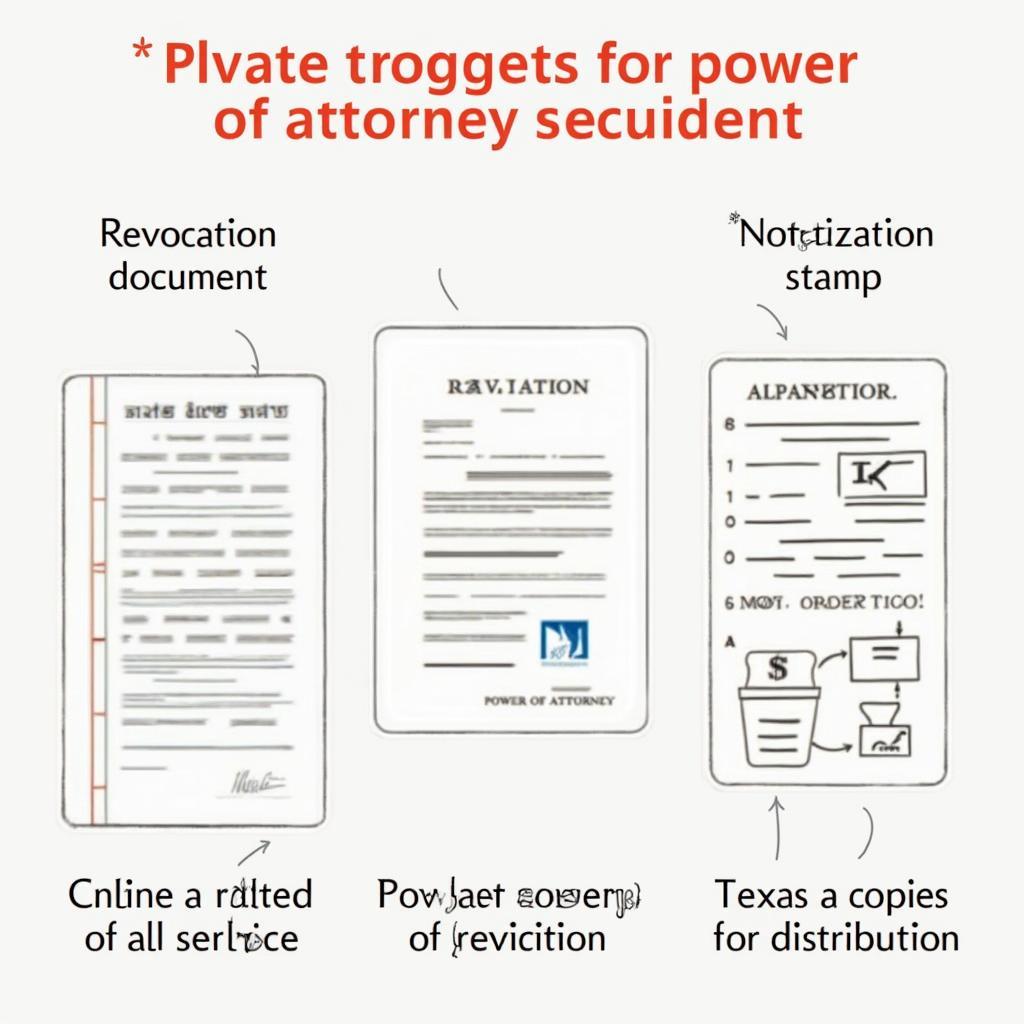
How to Revoke Power of Attorney in Texas
Revoking a power of attorney in Texas involves a specific legal process to ensure clarity and protect all parties involved. Understanding this process is crucial for both the grantor (the person giving the power) and the agent (the person receiving the power). This article provides a comprehensive guide on how to revoke power of attorney in Texas, covering the necessary steps, legal requirements, and potential complications.
Understanding the Revocation Process
Revoking a power of attorney isn’t simply a verbal agreement; it requires formal documentation and notification to ensure its legal effectiveness. This process safeguards the grantor’s interests and prevents the former agent from acting without authorization. In Texas, you must follow specific steps to legally revoke a power of attorney. Failing to adhere to these steps could lead to legal challenges and potential misuse of the granted power.
Steps to Revoke Power of Attorney in Texas
-
Draft a Revocation Document: Create a written document explicitly stating your intention to revoke the power of attorney. This document should clearly identify the original power of attorney document being revoked (including its date and any other identifying information) and the name and address of the former agent.
-
Sign and Notarize: The revocation document must be signed by the grantor in the presence of a notary public. This notarization validates the grantor’s signature and adds legal weight to the document.
-
Notify the Former Agent: Provide a copy of the signed and notarized revocation document to the former agent. This notification officially informs them that their authority has been terminated. This step is crucial to prevent any further actions taken by the former agent under the now-revoked power of attorney.
-
Notify Relevant Third Parties: Inform any individuals or institutions that may rely on the power of attorney (such as banks, financial institutions, or healthcare providers) about the revocation. This ensures that they are aware of the change and will no longer accept actions taken by the former agent.
-
Record the Revocation (Optional, but recommended): While not mandatory in all cases, recording the revocation with the county clerk’s office in the county where the grantor resides or where the property is located (if the POA pertains to real estate) provides an additional layer of protection. This public record serves as clear evidence of the revocation.
 Revoking Power of Attorney Documents in Texas
Revoking Power of Attorney Documents in Texas
When is Revoking a Power of Attorney Necessary?
Several situations warrant revoking a power of attorney. These include a change in the grantor’s mental capacity, a breakdown in trust between the grantor and agent, the completion of the task for which the POA was granted, or the death of either party. Understanding these situations will help you make informed decisions. Similarly to how long a power of attorney is valid, knowing when to revoke is just as important as knowing how to set one up.
What Happens if the Grantor is Incapacitated?
If the grantor becomes incapacitated after executing a durable power of attorney, the revocation process becomes more complex. A durable power of attorney remains effective even if the grantor loses mental capacity. A guardianship proceeding may be necessary to revoke the power of attorney in such cases.
Common Questions about Revoking a Power of Attorney in Texas
How long does it take to revoke a power of attorney?
The revocation itself is effective as soon as it’s properly executed and delivered to the agent. However, notifying all relevant parties can take additional time.
What if the agent refuses to acknowledge the revocation?
Even if the agent refuses to acknowledge the revocation, it’s still legally binding once properly executed and delivered. However, it is important to notify third parties who might rely on the POA.
Can I revoke a power of attorney without an attorney?
Yes, you can revoke a power of attorney in Texas without hiring an attorney. However, if you have complex circumstances, it is advisable to seek legal counsel.
Expert Insights
“Revoking a power of attorney is a crucial step in protecting your interests. Ensuring all steps are followed meticulously will minimize potential complications,” advises Pham Thi Mai, a seasoned attorney specializing in estate planning in Houston, Texas. “Don’t hesitate to seek legal counsel if you have any doubts or encounter any difficulties during the process.”
Nguyen Van Tuan, a leading estate planning attorney in Dallas, adds, “Proper notification is key. Informing all relevant parties prevents potential misuse of the revoked power and ensures a smooth transition.”
Conclusion
Revoking a power of attorney in Texas requires careful attention to detail and adherence to the prescribed legal process. By following the steps outlined above and seeking legal counsel when needed, you can effectively revoke a power of attorney and safeguard your rights. Understanding how to revoke power of attorney is essential for anyone who has granted this important legal authority. Don’t delay in taking action if you need to revoke a power of attorney.
FAQ
- Can I revoke a power of attorney verbally? No, a written revocation is required.
- Do I need a lawyer to revoke a power of attorney? Not always, but it’s recommended for complex situations.
- Where do I file the revocation? Notify the former agent and relevant third parties. Recording with the county clerk is optional but recommended.
- When does the revocation become effective? Upon proper execution and delivery to the agent.
- What if my agent refuses to accept the revocation? The revocation is still valid once properly executed and delivered.
- Can a revoked power of attorney be reinstated? Yes, by creating a new power of attorney document.
- What if the grantor becomes incapacitated after signing the POA? A guardianship proceeding might be required to revoke the POA.




